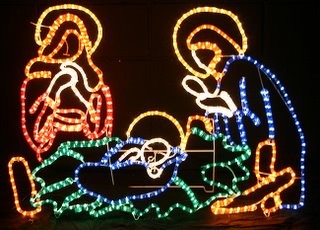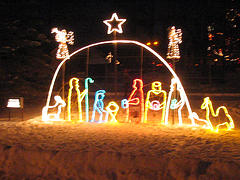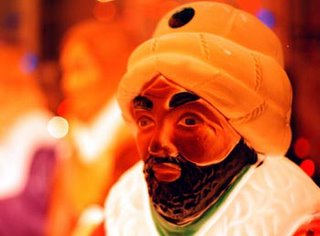
United Nations Declaration of the Rights of the Child (1959)
Principle 3: The child shall be entitled from his birth to a name….
Mary and I entered the shopping mall, comfortable like a couple who've been together for many years, but timid like those who've spent very little time in this unfamiliar city, we being tired and haggard, bitten by the wind and the rain and the years. We've been on the road too long, it seems, and those around us, young, happy, and affluent, brushed by without noticing us, as beautiful as we are. Inside the mall I unzipped all three of my leather jackets so those around us would see the beautiful new Chinese silk shirt Mary got me for the holiday, a shirt that makes me more beautiful. No one noticed, I'm sure. Except Mary. Mary says I don't need the shirt, that I'm beautiful already. I gaze lovingly at her, she being beautiful beyond measure.
Mary and I entered the shopping mall and made our way to the stationery store for me to buy new journals for the coming year to record the mileage of our time. We entered the mall, and I was proud of myself in my beautiful new shirt, and Mary held my arm like an old wife used to the foibles of her man; and I, tired from these long days of our journey here, looked lovingly at her as she held the little bundle that gives her so much joy, a bag of stuff she clutches tightly to her bosom as she goes from here to there, smiling, sometimes delighted, sometimes overcome by the flashing lights at Radio Shack, the electronic video games capturing her heart in a soulful way till her aeroplane crashes into the tarmac upon landing, and until the store clerk states: "Is there something here you'd like to bu-uy?" He stands unsmiling, frowning at an empty space on a shelf as Mary asks for a different game to play since the last one really sucked. I puff up my chest and show off my new silk shirt protectively. I turn discretely to display my plastic bag of store bought stuff, our parking validation bag, our cue to the world that we belong in the mall as legitimate folks. But, hey: off we go to get samples of ice-cream, off we go so Mary can increase the volume in her bag with shopping brochures and old lottery ticket stubs. Off we go. I show off my purchase to good effect, I think, until I see that my fingers have sweated so badly that the ink has smeared all over the bag, and my fingers are black. I put my hands in my pockets and pull open my jackets to show off the beautiful shirt Mary gave me. We shall be all watched over.
"They act like we're dead," Mary says. "They don't even look at us. When I want to ask about something, they turn away and talk to someone else." Maybe we don't look just right. Maybe we look like we've been on the road too long. Maybe we look like a couple of weathered fence posts.
But we're not dead. Just look at my shirt. I'm beautiful, and especially so is the beautiful girl I'm with. "They don't seem to want to sell us anything," Mary says.
What is there to say to man playing "Sometimes I feel like a motherless child" on a guitar, a man who responds: "It's a tune by Ritchie Havens from the movie Woodstock."
 Mary's hat is falling from the grace and style it might once have had when in its younger years its velvet was full and shiny brown; when the crown rose up with inner dignity, before it fell down to look more like the worn beret of a World War Two resistance fighter. Yes, the threads are loose. It is unraveled at the seams. My queen's crown is tarnished. Man, we've been on the road so long that longer than this we'll look like pavement.
Mary's hat is falling from the grace and style it might once have had when in its younger years its velvet was full and shiny brown; when the crown rose up with inner dignity, before it fell down to look more like the worn beret of a World War Two resistance fighter. Yes, the threads are loose. It is unraveled at the seams. My queen's crown is tarnished. Man, we've been on the road so long that longer than this we'll look like pavement.I look ahead, beyond the mall, and I say to Mary: Listen to this, beautiful girl, this poem by Rimbaud, this poem called "Childhood," this poem that comes to my mind as I gaze at you with the bundled treasures at your breast:
The paths are bitter
And the broom flowers cover the hills.
The air is still…
How far are the birds and the fountains!
To go on can only lead to the end of the world.
"You're taking up a good stall in the barn, buster," Mary says, though not to me but to a picture of a kitten on a postcard, though she could be speaking to me, I don't know, not being myself a psychologist of any repute.
We stand, side by side in the mall, and for once I'm happy, happy because I look like a king, and my beautiful girl is my queen. We slowly shuffle off to the department store to play air hockey, which I thought I'd won but that Mary says we tied, which probably means I lost. We look at black refrigerators and black stoves and black furniture. Black.
Mary's bundle grows as we walk through the mall. She finds things to add to her bag. Mary finds wonderful things that make her bundle of stuff better than it was. I don't understand female things like that, but I stand by smiling at those who stop to not look at us.
Beyond the road: the mall at Christmas. We have arrived.
 Our gods: I recall a bit from Conrad's Lord Jim and I want very much to tell Mary:
Our gods: I recall a bit from Conrad's Lord Jim and I want very much to tell Mary: "Some, very few and seen there but seldom, lead mysterious lives, had preserved an undefaced energy with the temper of dreamers. They appeared to live in a crazy maze of plans, hopes, dangers, enterprises, ahead of civilization, in the dark places of the sea, and their death was the only event of their fantastic existence that seemed to have a reasonable certitude of achievement."
When I lived in a commune and sold candles at the mall in Berkley, California back in 1970 I didn't grasp the significance of Richard Brautigan's poem "All Watched over by Machines of Loving Grace." I read it then, and I didn't understand. The poem was old even then, but I wasn't. Telegraph Ave. was old then, but I was just a lad.
I like to think (and
the sooner the better!)
of a cybernetic meadow
where mammals and computers
live together in mutually
programming harmony
like pure water
touching clear sky.
I like to think
……...(right now, please!)
of a cybernetic forest
filled with pines and electronics
where deer stroll peacefully
past computers
as if they were flowers
with spinning blossoms.
I like to think
……..(it has to be!)
of a cybernetic ecology
where we are free of our labours
and joined back to nature,
returned to our mammal
brothers and sisters,
and all watched over
by the machines of loving grace.
Mary smiles at me shyly sometimes, not knowing quite why I stop in mid-step and gaze off into space. She looks up at me from under the brim of her floppy velvet hat, and she waits gently like a warm breeze wafting around me. She holds her bag and smiles.
Our coffee gone, our evening long, we wonder where to find a place to stay for the night, given that all the rooms at the hostels are taken. We huddle in a doorway for a while. Three folks dressed up like they must have traveled from a Las Vegas Magic Show come by the doorway of the Starlight Diner and see us shivering in the damp. They give us a can of beer and a half pack of cigarettes. Mary sees a tea box in their bags, and she wants it because it's got a colorful label, the very thing Mary likes so much. One of the trio wisely passes it over, and Mary sticks it in her bag. The rooster clock starts making noises again, "erk er erk erooo," and Mary shakes it till it's quiet. The Magic Show girl cries out: "Be careful, you'll hurt him." I'll take that bitter path, I say to Mary, but I'll bet she's already forgotten about it.
"One of the defining characteristics of human beings is that their adaptation to the world depends," writes Anthony Storr in his book, Feet of Clay, "principally upon learning rather than upon those built-in behavioral patterns which govern the lives of creatures lower down the evolutionary scale. Man's infancy and childhood, relative to historical life-span, has been prolonged by evolution, with the consequence that there is additional time for learning to take place. Learning does not cease with the end of childhood. Many of us continue to learn all our lives, and enjoy doing so…. Our predisposition to go on learning is adaptive, but remaining teachable into adult life demands the retention of some characteristics of childhood…. One might add that man's adaptation is by means of maladaptation…. If we were perfectly adapted to the environment and the environment remained constant we might live in a state of blissful ignorance, unaware of any problems, but we should not be inventive because there should be no incentive to be so."
Outside, it's raining and cold, and no one smiles at us because I have my jackets done up to the chin, and no one can see my beautiful silk shirt. People don't look at Mary because they think she's a bag lady or something. Rain drips off her nose. She's very pretty. This is a bitter path, indeed. Mary has a bus pass. I tell her to get on the bus, warm up, dry out. Mary won't leave me. Instead she pecks at the discarded tickets in front of the subway station till she finds one she thinks I can use. It's really no good, I have to walk; and so-- Mary walks with me. It's a long way to some place to go. We go together. I feel beautiful again for some reason. It's not my beautiful shirt. It's because Mary is beside me. What was I thinking?

I was thinking of Rilke. I was thinking of an "Autumn Day." I was thinking of you.
Lord, it is time. The summer was so short.
Impose upon the sundials now your shadows
And round the meadows let the winds rotate.
He'll not build now, who has no house awaiting.
Who's alone now, for long will so remain.
Sit late, read, write long letters, and again
Return to restless perambulating
The avenues of parks when leaves down rain.
So on we go, we three: Mary holding close her nameless bag, grinning as she looks up at me with her beautiful green eyes. The paths are so bitter, and we are so far away from home. For dreamers it could only mean the end of the world.



1 comment:
Very artistic, Dag. I like that. There's a lot of transcendence, a lot of longing, a lot of tragedy in there.
The kind of lit I like; passionate stuff.
We'll have to talk about writers. You and I seem to be on a similar path, though I may be walking many steps behind you.
Post a Comment